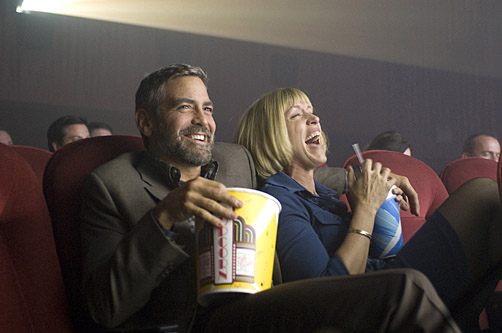
Like Lebowski after Fargo and Barton Fink after their magnum opus, Miller’s Crossing, Burn has that jaunty, drawing-outside-the-lines, devil-may-care ambience to it, which suggests the project was mainly just a mental sorbet of sorts for the brothers after their dour venture into (Cormac) McCarthyism, No Country for Old Men. In any case, I could see the film falling flat to those moviegoers ambivalent to or aggravated by Coenisms. But if, like me, you enjoy panning for hidden gold in their slow-fuse sight gags (among them this time are purple sex cushions, Jamba Juices, and Dermot Mulroney) and relish their penchant for eminently quotable buffoonery (“You too can be a spy, madam“), I suspect you’ll have a decently good time with Burn. There are worse fates in this world than having drunk the Coen Kool-aid.
Just to make sure we’ve all moved on from the dark contours of west Texas nihilism, Burn after Reading is basically goofy from Jump Street: It begins with a ludicrous eye-in-the-sky shot of Planet Earth, eventually zooming down into Langley, VA, that (give or take a few more flashy whip-pans and slo-mos) would seem more at home in a Tony Scott film. Our Great Eye soon settles upon the sacking from the Balkans desk of one Osbourne Cox (John Malkovich), a veteran CIA analyst with a hair-trigger temper, a cold, cuckolding wife (Tilda Swinton), and — at least by the standards of Mormons — a problem with the sauce. (To his credit, he tends to wait until exactly 5pm, and not a minute later, to commence the day’s boozing — On Mad Men, he’d be a teetotaller.) Determined to exact his revenge on the Bureau for this slight (and perhaps save face before both his wife and aging father, the very definition of silent reproach), Cox commences to penning his “memoirs,” most of which — in the venerable memoir tradition — is a ponderous, self-serving litany of blatant name-dropping. (He fancies himself as one of “Murrow’s Boys” to containment architect George Kennan. I would guess this self-assessment is somewhat inflated.)
But, due to some twists and turns involving divorce proceedings, Cox’s manuscript (in CD form) ends up in the hands of Linda Litzke and Chad Feldheimer (Frances McDormand and Brad Pitt), two enterprising, if somewhat clueless, employees at the local athletic center, Hardbodies. Alas, both Linda (blinded by her desire to procure cosmetic surgery and get off the Internet dating train) and Chad, not the brightest bulb on the tree in any event, make the critical mistake of thinking this “raw intelligence” is something somebody might actually be interested in, and thus said gym rats decide to blackmail Cox into paying for return of the CD. And, if that fails, well, they’ll still get theirs by going to the Russians with the data…but, of course, things don’t go exactly according to plan. Throw some X-factors into the equation — say, George Clooney as the paramour of both Mrs. Cox and Linda, a paranoid, lactose-intolerant US marshall who loves three things in this world: kinky sex, a good post-coital run, and quality flooring; or Richard Jenkins as the kindly Orthodox priest turned Hardbodies manager who nurtures a crush for Ms. Litzke from afar — and this proposed blackmail starts to get really, really complicated. It’s no wonder the CIA suits (J.K. Simmons and David Rasche) can’t wrap their heads around it. What are they, rocket scientists?
Now, a caveat: If you find Coen movies to be generally irritating, you’re probably going to loathe this film, and those critics who think the brothers are nothing more than elitist misanthropes (See, for example, Dave Kehr on No Country: “a series of condescending portraits of assorted hicks, who are then brutally murdered for our entertainment“) will have a field day in panning this film. To this line of criticism, I would say two things: First, Burn is assuredly the work of equal-opportunity misanthropes — It’s clearly as ruthless toward Malkovich’s self-centered, Princeton-educated ninny as it is to the good-natured boobs at Hardbodies. (Besides, speaking as someone who burnt out years ago on the Internet dating rigamarole, and who now runs mostly at night, partly to facilitate the Chet-and-his-iPod-type grooving, it’s not like the foibles of Coen’s characters here aren’t at least somewhat universal.)
Second, particularly every time I read the news these days and find not only that I’m honestly expected to take a silly, patently unqualified, score-settling and habitually dishonest fundie like Sarah Palin — a.k.a. an evil Marge Gunderson with the leadership skills of Johnny Caspar (minus his ethical instincts) and the stuck-in-Vietnam worldview of Walter Sobchak — seriously as a potential leader of the Free World, but that close to half of our country is actually enthused by this notion because, well, shucks, she’s “just like us”…well, I’m increasingly coming to the conclusion that intelligence is relative, and that elitist misanthropy (or misanthropic elitism, if you’d prefer) might just end up being the new black. It’s a Coen world, y’all. They didn’t make the rules, and they — and we — are just living in it.
